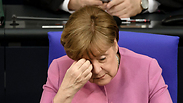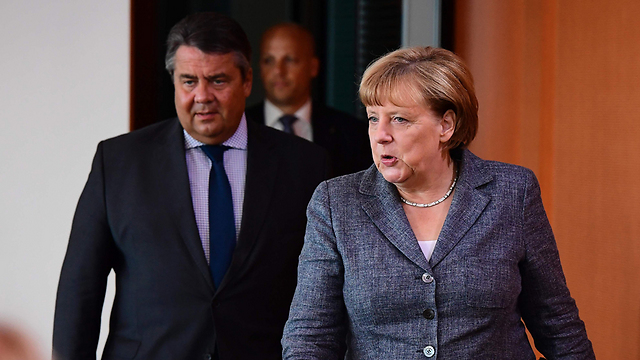
Merkel’s leadership challenge
Op-ed: Germany’s relationship with Israel must not be used for internal political needs. Instead of trying to impose suicidal solutions on Israel, Germany should stop supporting groups that are interested in Israel’s destruction.
German Foreign Minister Sigmar Gabriel in his typical sophistication, put Merkel in a catch-22 situation. Two weeks before extremely important local elections in North Rhine-Westphalia—the most populous state of Germany, which is home to large Muslim immigrant populations and is considered a traditional social-democratic stronghold—Gabriel created a conflict with Israel, which could only strengthen his Social Democratic Party in the elections and impact the general elections.
A victory in North Rhine-Westphalia could start a political snowball that may secure the social-democrats’ victory in the federal elections. Merkel had no choice but to back Gabriel in his dispute with Prime Minister Benjamin Netanyahu so as not to harm her party’s chance in the regional elections.

Internal political considerations and regional elections have motivated Merkel in the past to make decisions that contradicted the policy she had been elected to implement. For example, her dramatic decision six years ago—following the Fukushima Daiichi nuclear disaster—to shut down all the nuclear reactors in Germany.
This zigzagging, which is the result of Germany’s complex federal political structure, has caused many people to refer to Merkel is a spineless political opportunist. But in a country which holds regional elections almost annually—elections in which the elected government could lose the majority required to govern—Merkel, like all other chancellors before her, has no other choice if she wishes to secure her ability to keep leading.
Nevertheless, the issue of the relationship with Israel must not be used for internal German political needs. Merkel was the first and only European leader to declare her recognition of Israel as a Jewish and democratic state unhesitatingly and unconditionally. She included this recognition in the platform of her party and of her governments, and stated at the Bundestag, at the United Nations General Assembly and at the Knesset that Israel’s existence and security were part of Germany’s supreme national interest.
Precisely because of Germany’s huge commitment, it has been under a great amount of pressure from elements in the German establishment, in the German public opinion, in the European Union, and even in the Israeli Left, to enter a conflict with Netanyahu and his government. Merkel should deal with these pressures by demonstrating leadership rather than being dragged. Germany, like the EU, must realize that the Middle East has changed dramatically in the past few years, and that the traditional diplomatic mantras on the “two-state” solution have become irrelevant under the current circumstances. Merkel admitted that herself, while standing next to Netanyahu.
Instead of trying to impose suicidal solutions on Israel, Germany should stop supporting groups that are interested in Israel’s destruction. Merkel should stop listening to the bad advice she is receiving from some of her advisors and reconnect to comments she made only a decade ago, before and after her election: “Germany must adopt a policy which, when there is doubt, supports Israel’s stance and does not allow neutrality considerations.”
If Germany and Israel are interested in preserving their mutual relations, they must develop a real, sincere and open dialogue. It is unthinkable that Germany would impose on Israel a reality it is not interested in. Merkel should take this issue very seriously.
Eldad Beck is the author of "The Chancellor—Merkel, Israel and the Jews,” which was published in Hebrew by Yedioth Books.
(Translated and edited by Sandy Livak-Furmanski)










